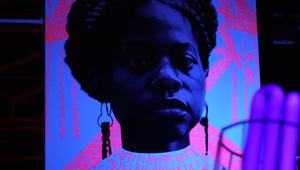
How AlmapBBDO and LG Combined AI, Air Conditioning to Ease Menopausal Hot Flushes

Using air conditioning to combat the symptoms of hot flashes seems like a no-brainer, right? Well for LG and AlmapBBDO it was, only now they have integrated wearable AI technology to detect and respond to symptoms of hot flashes in a newly released initiative, ‘Menopause Mode’.
Technology aside, this project places human truth above all. Research estimates that around 29 million women in Brazil are currently menopausal, with a third of them experiencing moderate to severe hot flashes. The initiative, therefore, was born out of a desire to prioritise wellbeing, bring about meaningful change and deconstruct pre-existing taboos around the menopause, whilst making use of new technologies.
Explaining why they “believe it’s cool to look human”, AlmapBBDO’s creative directors Daniel Chagas and Daniell Rezende give LBB’s Abi Lightfoot the lowdown on how they helped women cool down.
LBB> What was the brief from LG and what were your initial thoughts when you saw it? How did it begin the process to the final idea?
Daniel and Daniell> LG is all about technology making people’s lives better. So when they asked us to create an initiative for their Dual Inverter air conditioning with AI, we thought it would be a great opportunity to think of how this product could benefit people. Since women in menopause suffer from hot flashes and are often neglected by many brands and campaigns, we decided to take on the issue.
LBB> The statement “Artificial Intelligence is more intelligent when it’s more human.” rings true throughout this campaign. How did you marry AI technology with lived human experiences?
Daniel and Daniell> It’s an interesting thing, because we’re not inventing the technology anymore: AI is there already. What we’re inventing are ways to use it. But mostly, it’s the same process as usual, whenever we have to come up with a campaign or idea, we look for a human truth – something that people can relate to – and take it from there. In this case, the output was more than a campaign.
LBB> Technologically, how did you pull this off? Please talk us through the process of working with the AI.
Daniel and Daniell> It’s a smartwatch app that uses the device’s sensors to monitor a person’s oxygenation, body temperature, and heartbeat. When these three vital signs show some significant alteration, the app understands that the person in menopause is going through a hot flash. The app then communicates with ThinQ, LG’s connectivity app, which tells the air conditioner to lower the temperature. When the hot flash ends, the air conditioner’s temperature goes back to normal. Basically, it was a combination of technologies meant to teach AI how to identify a hot flash.
LBB> The data speaks for itself, showing 1/3 of Brazilian women will experience severe hot flashes during menopause. Despite this, it’s still a widely underrepresented market, why did you decide that it was the right time to launch this campaign?
Daniel and Daniell> It was the right time to launch this campaign exactly because it’s still widely underrepresented. Most brands believe there are ‘young people issues’ and ‘old people issues’. And they’re constantly avoiding those ‘old people issues’, maybe because they think it’s cool to ‘look young’. We believe it’s cool to look human. And when we talk about human issues, we’re talking to everyone, young or old.
LBB> The campaign spotlights a number of women of varying ages, tackling the perception that the menopause only affects women of a certain age demographic. What was the reasoning behind this?
Daniel and Daniell> Because it’s a fact. Women between the ages of 40 and 45 may experience early menopause. Even women under the age of 40 may go through premature menopause. We thought it would help to cast women of different ages because it would help break all the taboos around menopause. By the way, all the women in the campaign are actually going through menopause.
LBB> How did you go about casting the women seen in the ad?
Daniel and Daniell> They had to know what it feels like. They had to be in menopause. They had to know what hot flashes were. It wouldn’t make sense for us otherwise.
LBB> The spot makes use of colour in a way that makes even audiences feel hot and clammy, empathising with the women on screen, before brightening as Menopause Mode kicks in. What were the creative decisions behind this?
Daniel and Daniell> We wanted to show menopause as it is. And it can be challenging. It can be hard. It can ruin one’s sleep. Anyone going through it should watch the spot and think, “yes, that’s it, that’s how I feel, I’m not alone”. When we avoid showing the harsh parts of life, people tend to think there’s something terribly wrong with them. We wouldn’t like to make them feel like that.
LBB> What were the trickiest components and how did you overcome them?
Daniel and Daniell> The first and most important question was, “ok, now how do we identify a hot flash as it happens?”. We had long talks with gynaecologists who have specialised in menopause and its symptoms. It felt like attending a medical congress. And it was actually one of the best things about diving into this project: we have learned a lot.
LBB> More generally, what are your predictions for the 'smart home' of the future?
Daniel and Daniell> Now that’s tricky: predicting. A new thing we can say this project brings to the subject is that the next smart home may react not only to voice commands but also to the body itself.















